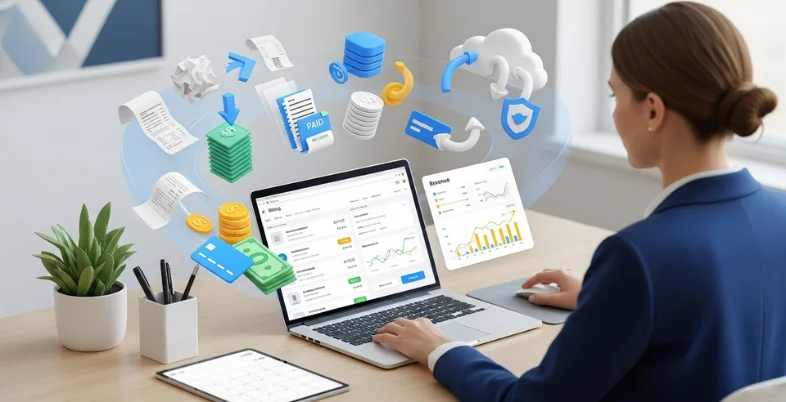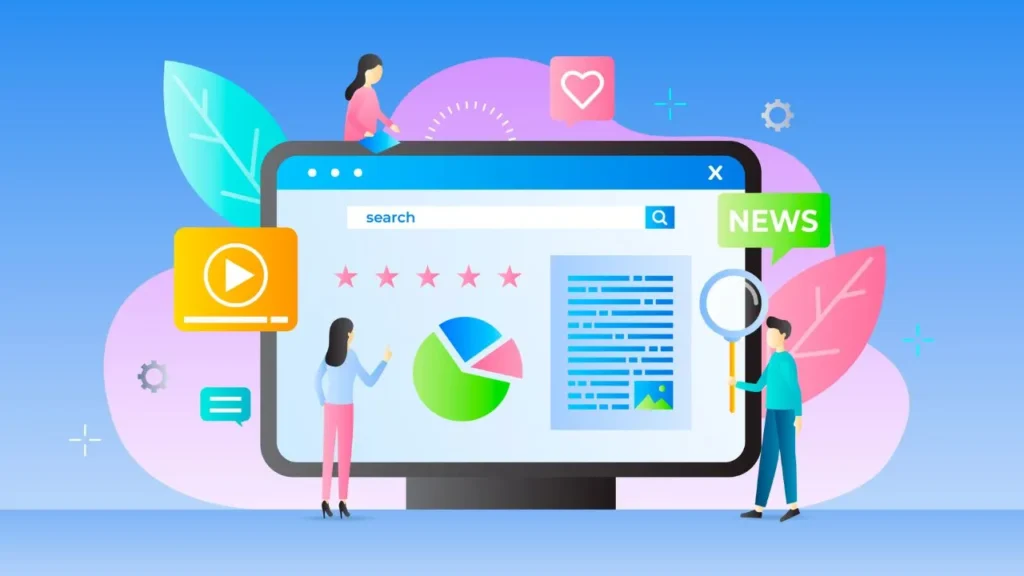It does not matter whether you are a small business owner, a startup project, or a freelancer; you have inadequate time to devote to your finances. Here you have two options: the first is to employ an on-site accountant, or employ billing software or small business invoicing software.
Through these applications, you can follow your financial record, goods and services you offer, as well as the dollars that customers owe you.
Even the number one invoice builder will enable you to automate the entire process of doing invoices online, which includes making estimates, entering hours worked, and receiving payment. Also, being an entrepreneur in a small business, or a freelancer, the billing software that you will use must cover all aspects of it, including mobile applications and others.
These billing and invoicing software are made by small businesses, and often have internal usable features giving you everything you need to advertise your business. However, you cannot waste time investing in such applications because of the time.
Nevertheless, through the services of an offshore accountant, you can concentrate on nothing but your business and leave financial affairs to the specialist.
We present a list of the best billing software for small businesses applicable in the operations of a small business, each is made in such a way that it responds to particular needs:
Why Billing Software Matters to Your Business
- Saves Time – Automates billing, invoicing, and expense tracking, reducing repetitive manual work.
- Reduces Errors – Ensures accurate calculations with built-in automation, eliminating manual entry mistakes.
- Improves Cash Flow – Tracks due payments, sends reminders, and helps you get paid faster.
- Enhances Professionalism – Generates branded and professional bills that build client trust.
- Simplifies Record Keeping – Stores and organizes all financial records for easy tracking and tax filing.
- Supports Business Growth – Frees up time so you can focus on scaling operations instead of handling paperwork.
- Enables Anywhere Access – Cloud-based billing software lets you manage finances from any device, anytime.
List of 12 Best Billing Software for Small Businesses in 2025
1. QuickBooks Online
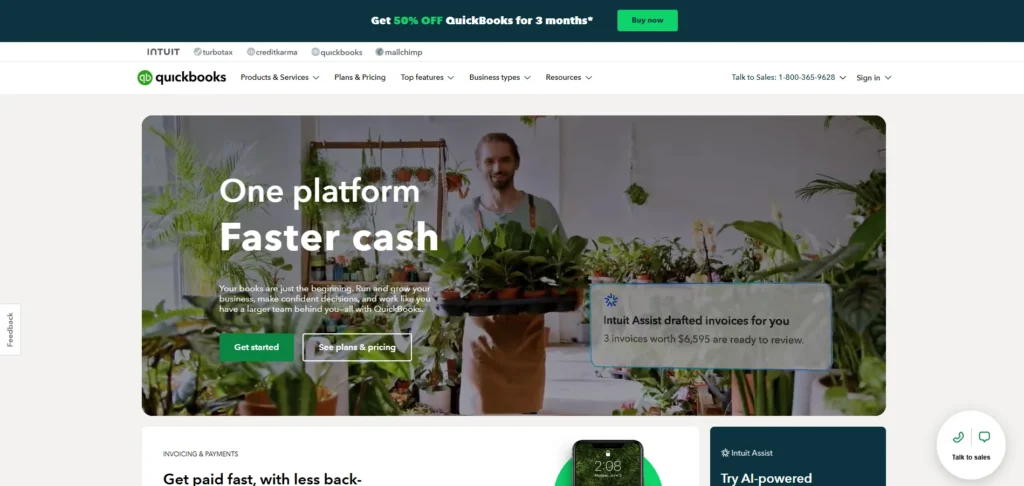
QuickBooks Online is a reputable brand in the small business market that provides a professional service in the control of billing requirements. It is known to be reliable and could be used simply, thus being fit in a business in various industries. A lot of business people love it because it has already established itself and has proven to perform steadily over time. It was specifically developed to keep up with current business requirements and offers a seamless manner in terms of dealing with daily financial challenges.
The QuickBooks Online remains a first choice among business owners who like things to be organized and systematized.
Features:
- Recurring billing: Automates the regular sending of invoices to clients without manual effort.
- Multi-currency support: Enables billing and accounting in different currencies for global clients.
- Customizable invoices: Allow personalizing invoices with logos, colors, and custom fields.
- Tax filing automation: With integrated tools and reporting, it makes tracking and submitting taxes easier.
- Mobile app: Access and manage billing on the go through smartphones.
Pros:
- Easy to use: Intuitive interface suitable for business owners without accounting backgrounds.
- Strong integrations: Connects seamlessly with banks, payment gateways, and other software.
- Reliable customer support: Offers extensive support resources and responsive help.
Cons:
- Costly for micro businesses: Pricing can be high for sole proprietors or very small firms.
- Limited advanced reporting: Custom report options are fewer compared to enterprise tools.
Pricing:
- Simple Start: $38/month (1 user)
- Essentials: $75/month (3 users)
- Plus: $115/month (5 users)
- Advanced: $275/month (25 users)
2. FreshBooks
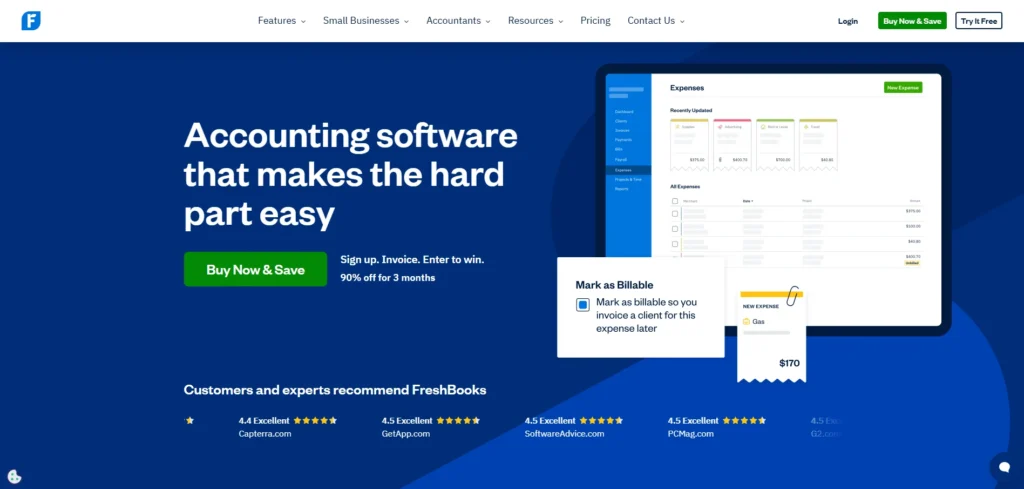
FreshBooks is a billing application and invoice management software that assists small-scale enterprises in maintaining clarity and proper management of their finances. It is commonly used as its interface is user-friendly and most suitable for freelancing, start-ups, and expanding businesses. It also serves a broad range of industries and is, therefore, an adaptable business option for entrepreneurs.
The organization of FreshBooks is oriented to the modern business context, so it offers the freedom of work and regularity. It is also an established brand in billing management because of its professional and reliable configuration, which many business owners adopt.
Features:
- Automated billing: Sends invoices and payment reminders automatically to clients.
- Time tracking: Logs billable hours linked to projects and invoices.
- Expense management: Monitors company expenses and links them to invoices.
- Client management: Stores client info and communication history in one place.
- Create and send invoices at any time using your mobile device with mobile invoicing.
Pros:
- User-friendly: Clean and intuitive design, easy to onboard new users.
- Powerful automation: Saves time with automatic invoicing and reminders.
- Good integrations: Connects with apps for payments, project management, and accounting.
Cons:
- Pricing rises with growth: Costs increase as you add clients or users.
- Limited advanced accounting: Not built for complex financial operations.
Pricing:
- Lite plan: $15/month
- Plus plan: $33/month
3. Zoho Invoice
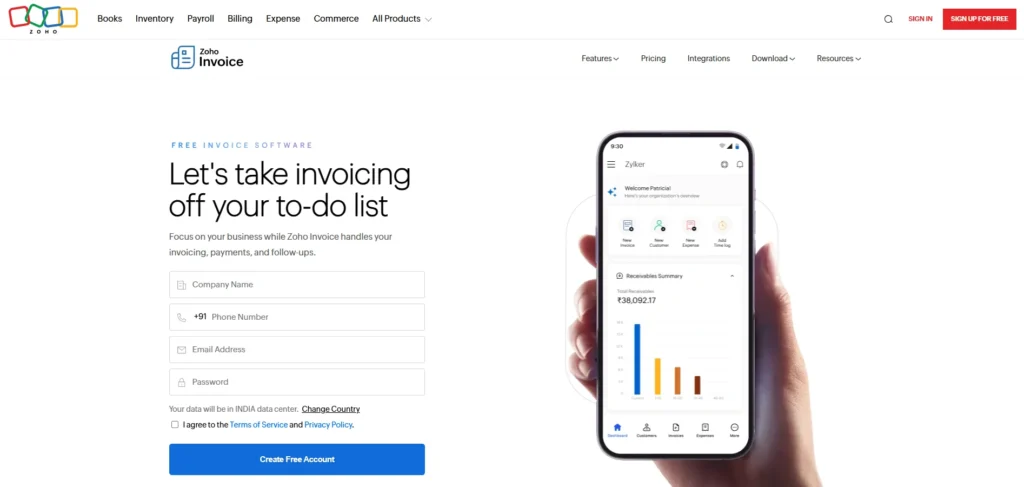
Zoho Invoice forms part of the larger Zoho business, offering to small businesses a billing based platform. It is well-received because it is simple in design, which assists companies in remaining organized. Applicable in various industries, it aids companies that need transactions to be clean and captureable.
Because of its dependability in providing services, Zoho Invoice enjoys a positive reputation. To those businessmen who need a reliable billing tool, it can also present an accurate mix of practical and professional operations.
Features:
- Multi-currency billing: Supports invoices and payments in various international currencies.
- Recurring billing: Automatically generates invoices on scheduled cycles.
- Client portal: Allows clients to view, approve, and pay invoices online.
- Customizable templates: Design invoices matching your brand style.
- Mobile apps: Manage invoices and payments from mobile devices.
Pros:
- Free tier available: Most small businesses can use it for free.
- Strong app ecosystem: Integrates with other Zoho apps and third-party solutions.
Cons:
- Basic accounting features: Less suitable for businesses needing comprehensive accounting.
Pricing:
- Free for basic use
- Paid plans from $9/month
4. Xero
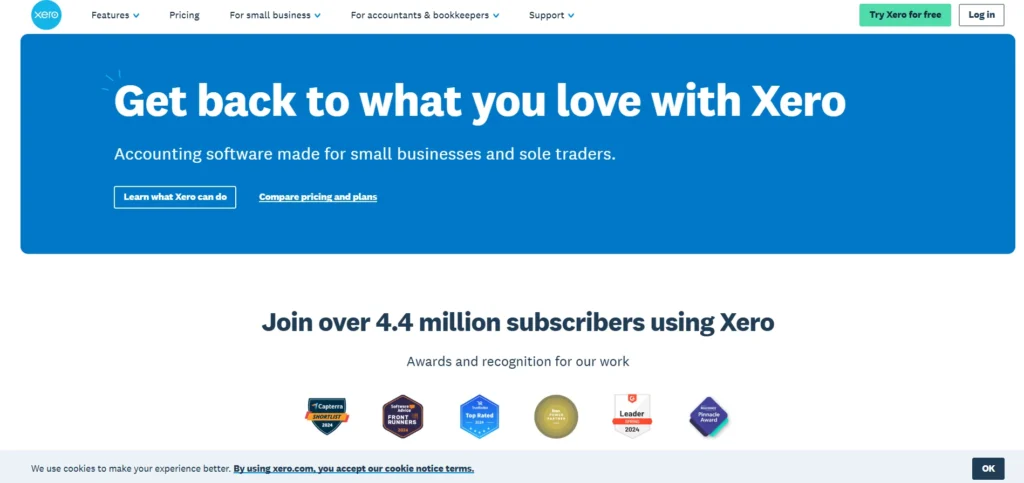
Xero is a platform well known all over the world that small companies are applying to manage billing, accounting procedures, and invoice management software needs. It is now one of the most popular options among businesses that care about a convenient and properly organized solution. This is the characteristic that is valued by most business owners in different industries and is considered to be structured in dealing with transactions.
The Xero is to be reconciled with the demands of local and international businesses. It has remained a credible business name when it comes to business finance, as it provides a solid base in the management of the business.
Features:
- Financial reporting: Generates detailed reports on business financials.
- Invoice tracking: Monitors invoice status and payment progress.
- Multi-currency: Handles transactions in different currencies with ease.
- Payment scheduling: Allows setting automatic payment due reminders.
- Bank integration: Syncs with bank accounts for real-time reconciliation.
Pros:
- Highly scalable: Grows with your business, suitable for expanding companies.
- Comprehensive reporting: Insights help strategic decision-making.
Cons:
- Learning curve: It may take time for new users to master the platform.
- Limited invoice design options: Templates are fewer and less customizable.
Pricing:
- Starts at $11/month
5. Wave
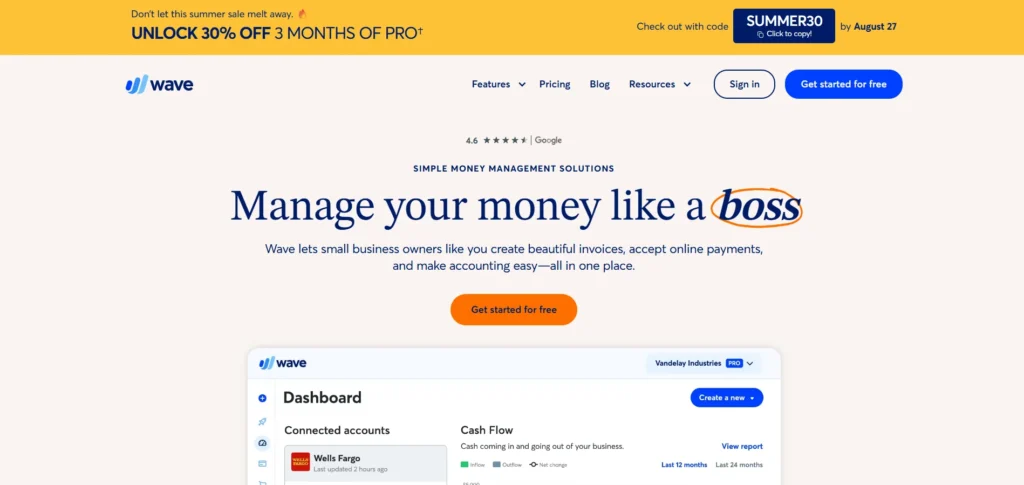
Wave is a large billing platform that is popular among owners of small businesses. It can be adopted in most industries, including retail and service-based industries. Its accessibility makes it permissible to use by the entrepreneur to keep financial records without going overboard. As an invoice management software, Wave simplifies financial processes and ensures smooth billing operations.
The consistent increase in the popularity of Wave is due to its compatibility with contemporary business-related contexts. It continues to be an acknowledged alternative to those who prefer to have clear and efficient billing management.
Features:
- Unlimited free invoices: You are not restricted in the number of invoices you can generate.
- Receipt scanning: Digitally captures expense receipts via the app.
- Expense tracking: Organizes spending for budgeting and reporting.
- Mobile app: Manage finances and invoices on the move.
- Basic reports: Includes profit/loss and tax summary reports.
Pros:
- Completely free: No cost for basic invoicing and bookkeeping.
- User-friendly: Simple and straightforward interface.
Cons:
- Limited functionality: Does not include the sophisticated accounting features found in software that costs money.
- Paid customer support: Free users receive limited support options.
Pricing:
- Free; premium features $16/month
6. Stripe Billing
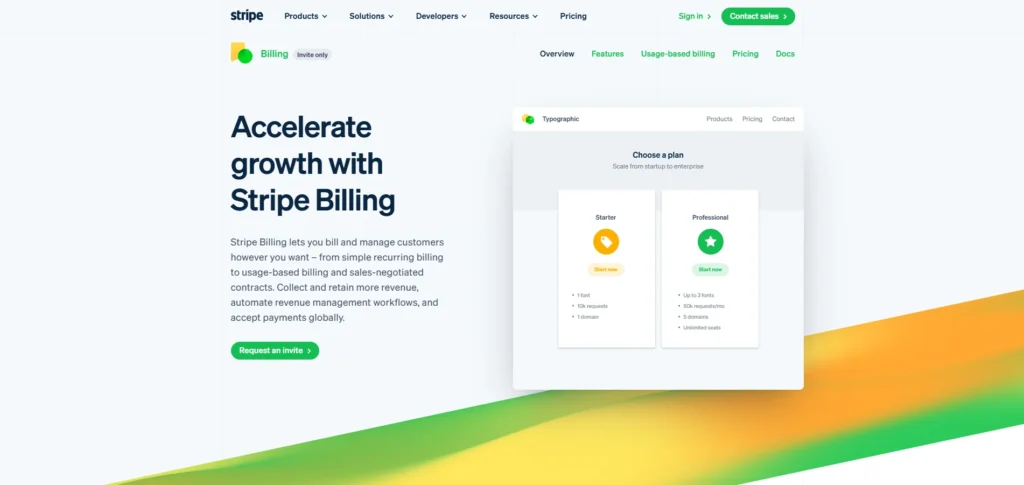
Stripe Billing is a corporate billing tool that is well-relied on by global businesses to facilitate transactions. It is made to integrate into various forms of businesses easily, making it a strong option for those seeking billing software for small businesses as well. A large number of firms prefer it due to its flexibility in online and service practices.
Stripe Billing makes it easy to manage finances, and thus, businesses can remain organized. Its outstanding presence in the globe has ensured that it has become a respectable choice among businessmen in search of a reliable billing tool.
Features:
- Subscription management: Supports recurring subscriptions and billing models.
- Usage-based billing: Charges customers based on usage metrics.
- Multi-currency support: Bills in numerous currencies globally.
- Integrations: Connects with many e-commerce and SaaS platforms.
- Advanced analytics: Detailed billing and revenue reporting.
Pros:
- Excellent for subscriptions: Tailored for SaaS and recurring payments.
- Robust reporting: Provides valuable financial insights.
Cons:
- Complex for simple billing: Overkill if you don’t need subscription features.
Pricing:
- Custom and transaction-based pricing
7. Square Invoices
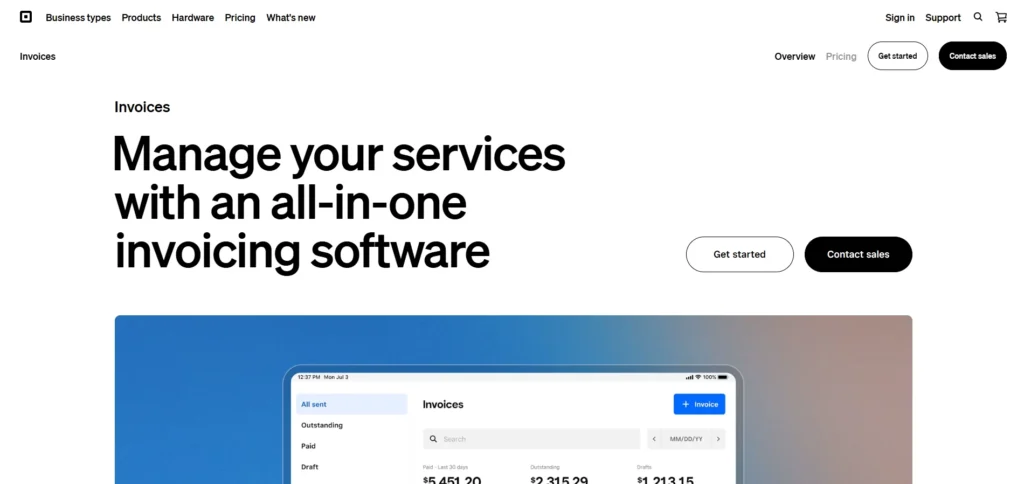
Square Invoices is a billing platform that can be used by business owners who own small enterprises and would prefer to get a straightforward approach to billing procedures. It is commonly applied in various fields, including retail stores and service companies.
As a system to maintain the business functioning, it makes the records of transactions clear. Small business owners find it favorable since it offers a balanced management style in both small and growing businesses. Square Invoices has been an established and reliable tool in the market of billing software.
Features:
- Batch invoicing: Send multiple invoices simultaneously.
- Payment portal: Enables clients to pay online easily.
- Mobile support: Create and track invoices using mobile devices.
- Integrations: Works well with Square’s POS and payment products.
Pros:
- Fast payments: Streamlined payment process boosts cash flow.
- Great for retail: Tailored to small shops, cafes, and service providers.
Cons:
- Transaction fees: Fees per payment can add up with volume.
- Limited customization: Invoice design options are basic.
Pricing:
- Free to use; transaction fees apply (3.3% + $0.30 per invoice)
8. MyBillBook
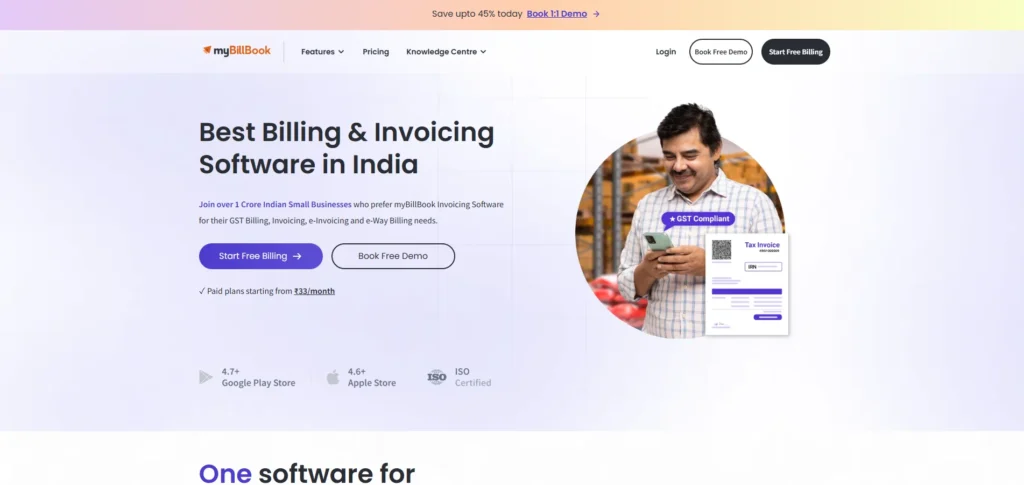
MyBillBook is a simple billing service created in India with the small business owner in mind who wants a simple tool to facilitate transactions. It serves the needs of a vast scope of industries such as retail, wholesale, and services. It is renowned because of its applicability to the needs of local businesses, as it keeps financial records neat and recoverable.
Most entrepreneurs use it owing to its flexibility to various styles of operation. MyBillBook remains a rising solution to individuals who are in need of an orderly billing program in India.
Features:
- GST-compliant invoices: Ensure Indian tax compliance.
- Inventory tracking: Monitors stock levels alongside billing.
- Automated reminders: Send payment reminders automatically.
- WhatsApp integration: Share invoices instantly via WhatsApp.
Pros:
- Local GST focus: Tailored for Indian business taxation.
- Mobile-friendly: Good app and user experience.
Cons:
- Desktop-only for some features: Limits flexibility.
- No international billing: Geared mainly toward the Indian market.
Pricing:
- Paid plans; free trial available
9. Vyapar
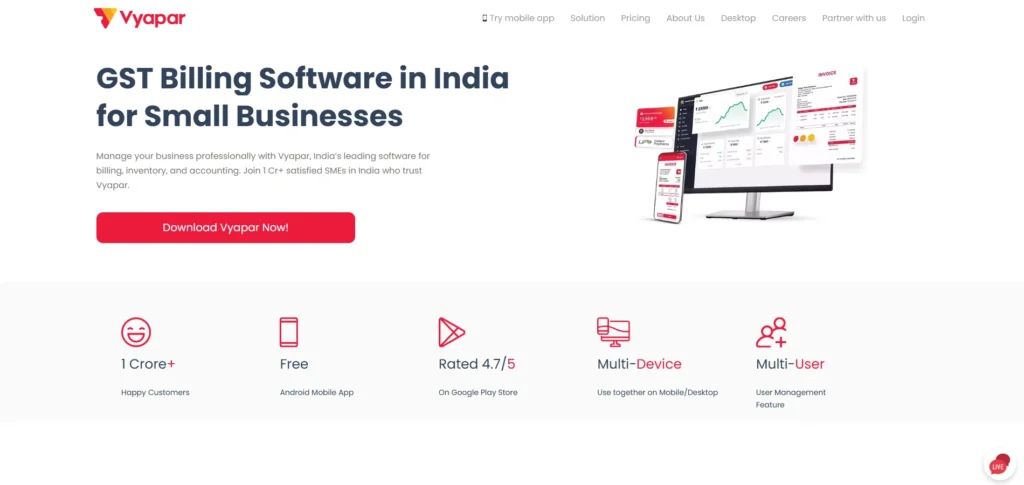
Vyapar is a billing and accounting software that has been designed to satisfy the requirements of small businesses unique to India. It is suitable for businesses in diverse fields, as they include retailers, service providers. Vyapar also allows an entrepreneur to have well-organized records, which enables their successful daily activities.
It also targets the Indian market, and it is very practical and close to local business problems. It has, of late, gained an authoritative stature as a billing solution to small enterprises.
Features:
- GST-ready invoicing: Compliant billing for the Indian tax system.
- Inventory management: Tracks items, sales, and stock.
- Modern digital payment systems are supported by barcode and QR codes.
- Expense tracking: Monitors business expenses.
Pros:
- Affordable: Cost-effective for Indian small businesses.
- Works offline: Useful where internet access is limited.
Cons:
- Desktop-centric: Minimal cloud functionality.
- Basic UI: Less polished user interface.
Pricing:
- Starts at ₹2,499/year (~$30/year)
10. Tally Solutions (TallyPrime)
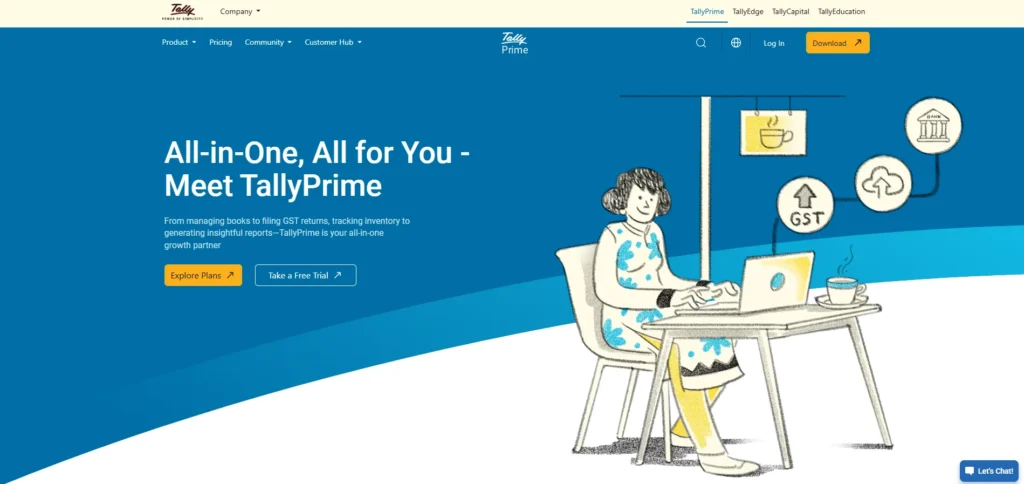
One of the most recognized brands in the Indian business software market is TallyPrime, offered by Tally Solutions. It is used by the majority of small and medium-sized organizations for accounting and billing management. It has gained a reputation for being reliable, and this is because it has been very strong in the Indian market.
TallyPrime is versatile because it fits different types of businesses, which makes it flexible for business people. Its history and prominence have established it as a household name internationally, as far as business practice is concerned.
Features:
- GST e-filing: Automates the filing of goods and services tax.
- Inventory and payroll: Comprehensive stock and employee management.
- Financial reporting: Detailed accounting reports.
Pros:
- Indian industry standard: Trusted by many SMEs.
- Scalable and robust: Handles growing business needs.
Cons:
- Not cloud-based: Limited remote access.
- Complex for beginners: Steeper learning required.
Pricing:
- Around ₹7,200/year (~$90/year)
11. Conta
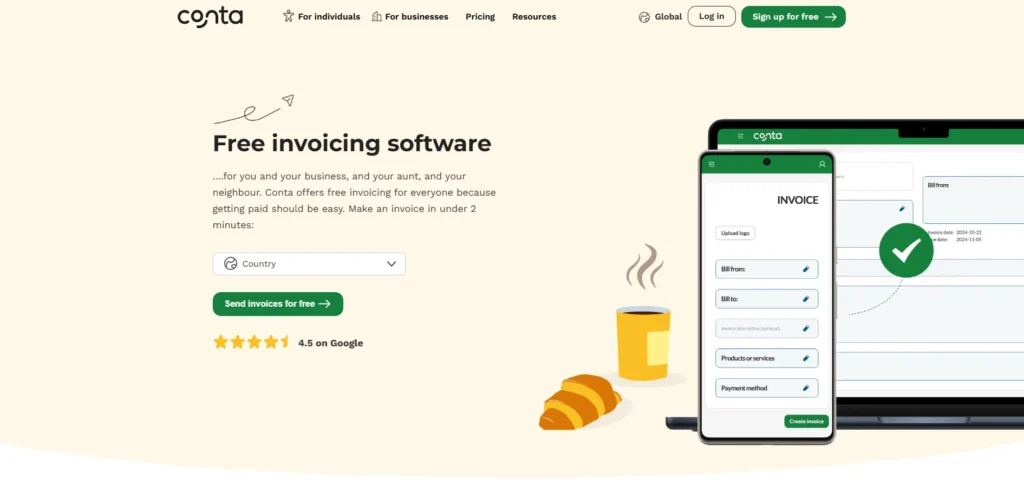
Conta represents a billing system, where small companies can make their financial records well-organized. It also serves various kinds of businesses; thus, billing procedures are maintained to be straightforward yet professional.
Businessmen also appreciate the ease with which it can be used to coordinate operations devoid of unneeded complexity. The design by Conta can fit any industry, whether startups or already established businesses. It remains a choice among those patients seeking a simple way of billing.
Features:
- Professional invoice creation: Custom, branded invoices.
- Recurring billing: Automates invoice cycles.
- Mobile-friendly: Fully functional on smartphones.
- Automated payment reminders: Reduce late payments.
Pros:
- Free to use: No cost for core features.
- Fast setup: Easy to start without expertise.
Cons:
- Basic automation: Lacks advanced features.
- Limited reports: Minimal financial insights.
Pricing:
- Free
12. Sage Intacct
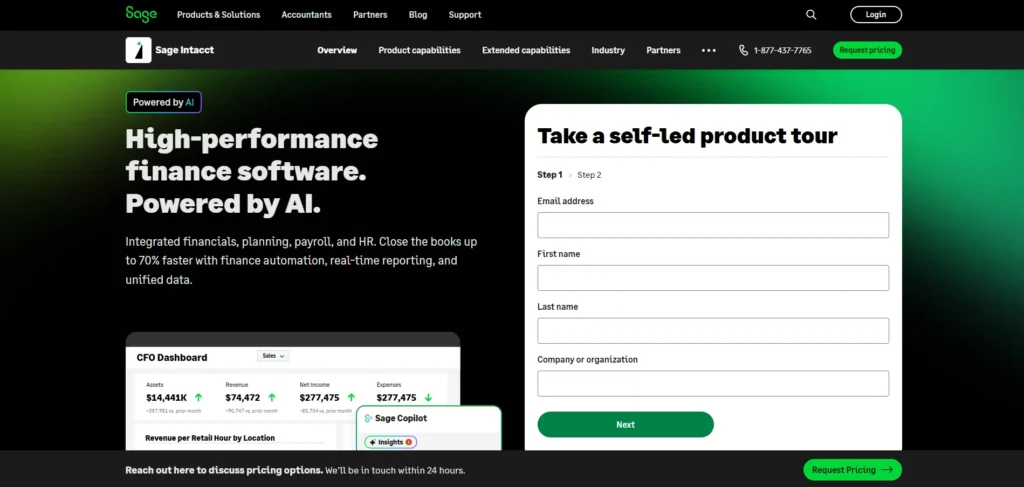
Sage Intacct is a cloud-based financial management and billing software that smaller businesses of all sizes use. It depends on keeping processes clean and orderly in transactions. Entrepreneurs of small businesses appreciate its proper establishment and flexibility regarding various sectors.
A developed reputation evolving around regular execution and systematic mode is what Sage Intacct has relied on. It has been a highly respectable option for businesses that aspire to consistent and stable operations in billing.
Features:
- Financial analytics: Deep business insights through reporting.
- Automated billing: Reduces manual billing processes.
- Multi-location support: Manage billing across sites.
- Integrations: Connects with various enterprise platforms.
Pros:
- Scalable: Suited for mid to large businesses.
- Strong integrations: Enhances productivity.
Cons:
- Higher cost: Expensive compared to SMB alternatives.
- Complex setup: Requires specialist knowledge.
Pricing:
- Custom pricing based on business needs
Also Read: Cloud Management Platforms
Comparison of the Best Billing Software for Small Businesses in 2025
| Software | Invoicing | Expense Tracking | Recurring Billing | Mobile App | Pricing Range | Best For |
| QuickBooks Online | Yes | Yes | Yes | Yes | $38 – $275/month | Small to medium businesses |
| FreshBooks | Yes | Yes | Yes | Yes | $15 – $33/month | Freelancers, small businesses |
| Zoho Invoice | Yes | Yes | Yes | Yes | Free to $9+/month | Freelancers, startups |
| Xero | Yes | Yes | Yes | Yes | Starting $11/month | Growing small to medium-sized firms |
| Wave | Yes | Yes | No | Yes | Free (paid add-ons $16/month) | Freelancers, startups |
| Stripe Billing | Yes | Yes | Yes | Yes | Custom pricing | SaaS, subscription businesses |
| Square Invoices | Yes | Limited | No | Yes | Free + transaction fees | Retailers, small businesses |
| MyBillBook | Yes | Yes | Yes | Yes | Paid plans, free trial | Indian small businesses |
| Vyapar | Yes | Yes | Yes | Yes | Around $30/year | Indian small businesses |
| Tally Solutions | Yes | Yes | Yes | Limited | Around $90/year | Indian SMEs |
| Conta | Yes | Limited | Limited | Yes | Free | Small businesses, startups |
| Sage Intacct | Yes | Yes | Yes | Yes | Custom pricing | Medium to large businesses |
Choosing the Best Billing Software for Small Business
When selecting the finest billing software for a small business, take into account the following factors:
- Ease of Use and Accessibility: Choose billing software with a user-friendly interface that is easy to navigate. Simplicity reduces the learning curve and helps you and your team manage billing tasks efficiently without technical expertise. Also, software that works across multiple devices—such as desktops, tablets, and smartphones—enables you to access your billing system anytime and anywhere, improving flexibility and responsiveness.
- Billing Process Compatibility: It’s important to select software that supports the specific types of billing your business uses, such as one-time invoices, recurring billing for subscriptions, or tiered pricing models. Software tailored to your billing style will streamline operations, reduce manual work, and help maintain accurate client invoicing.
- Cloud-Based Functionality: Cloud-based billing software offers the advantage of remote access, allowing you and your staff to work from any location with internet connectivity. It also ensures that your data is automatically synchronized and backed up in real time, protecting against data loss and keeping your financial records up to date.
- Security and Compliance: Protecting sensitive financial and customer data is critical. Look for software that uses strong encryption, secure login processes, and regular backups. Additionally, ensure the software complies with relevant industry standards and regulations (such as PCI-DSS for payment data or GDPR for data privacy) to avoid legal risks and safeguard your business reputation.
- Pricing and Scalability: Billing software should fit your current budget and offer pricing plans that allow you to scale up as your business grows. This means having the option to add users, access advanced features, or handle higher transaction volumes without facing prohibitive cost increases. A scalable solution grows with your business needs, saving you from expensive switching later.
Conclusion
Investing in the proper billing software for small businesses will not only allow you to keep your financial records straight, or bring a greater amount of order and efficiency into your business practices. The instruments that we have discussed in the list protect a wide range of options, which suit businesses, small and large, across different verticals, from basic invoice creation and comprehensive billing automation. Identifying the correct solution that meets the needs of your clients depends on a good evaluation of your needs, budget, and the degree of customization you prefer.
The appropriate software will not only save you time and minimize errors associated with manual work, but it will also make sure that your payments are at the right time, that you can control and manage cash flow, and improve your relationship with clients. Ultimately, a well-chosen billing platform becomes more than just a tool—it becomes a strategic partner in your business growth.
FAQs
1. What is Billing Software, and Why Should Small Businesses Use It?
Billing software: Billing software is a program that aids businesses in creating invoices, monitoring payments, and organizing billing for clients. It has advantages whereby small businesses save time, eliminate manual errors, and have their payments made on time.
2. Which Piece of Software is Best for Billing my Company?
Before choosing the billing software, take into account such factors as ease of use, customization capabilities, compatibility with tools used in accounting, data security, and support. You can also make an informed choice with trial versions.
3. Is Software for Cloud Billing Better Than Offline Software?
The strength of cloud-based billing software is that the operations can be executed remotely, it can update automatically, and it can be shared in real time. The offline models do not require the internet, but could be out of date and rigid.
4. Is it Possible to Use Billing Software to Cover Various Currencies and Taxation Rates?
The majority of the advanced billing software can deal with various currencies and tax settings and, therefore, can be appropriate in those businesses that work with foreign customers or are located in an area with another tax framework.
5. Is Billing Software Technical?
No. Using Billing software is a relatively simple procedure because they have created most billing software has been created with user-friendly interfaces, drag and drop functions, as well as step-by-step guides.


